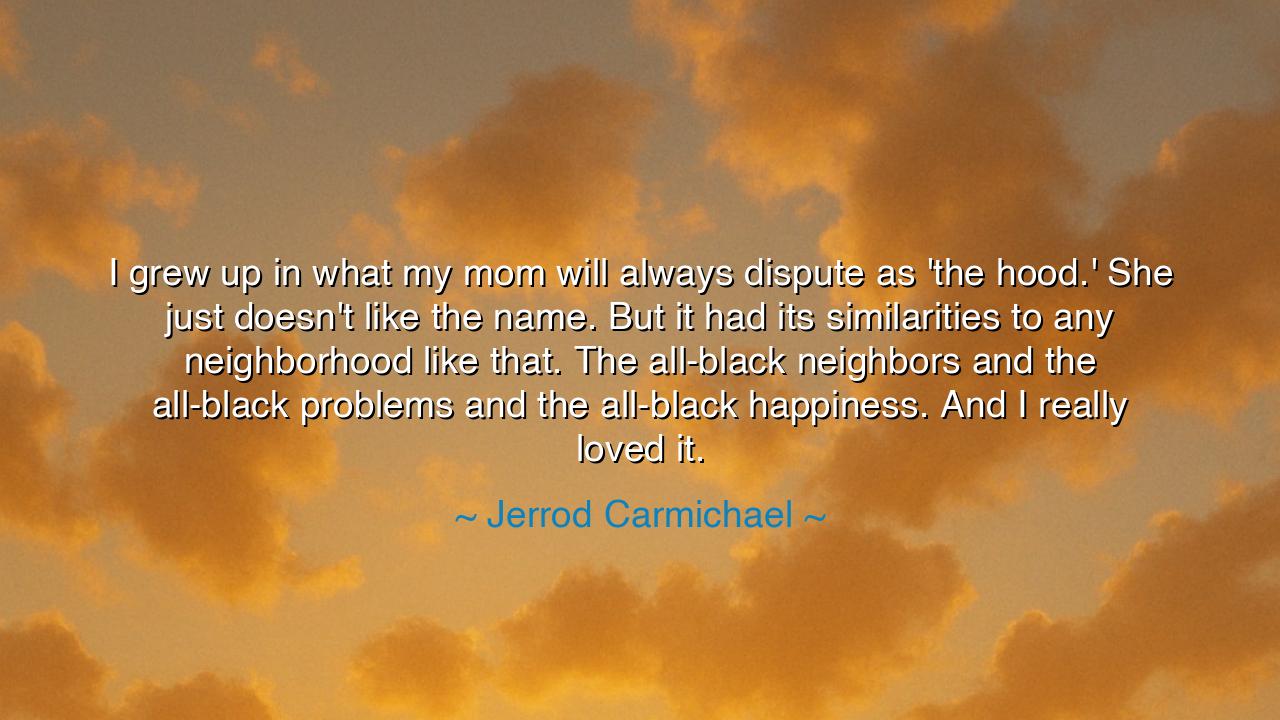
I grew up in what my mom will always dispute as 'the hood.' She
I grew up in what my mom will always dispute as 'the hood.' She just doesn't like the name. But it had its similarities to any neighborhood like that. The all-black neighbors and the all-black problems and the all-black happiness. And I really loved it.






In the reflective and tender words of Jerrod Carmichael, we find a truth that resonates across generations and borders: “I grew up in what my mom will always dispute as ‘the hood.’ She just doesn’t like the name. But it had its similarities to any neighborhood like that. The all-black neighbors and the all-black problems and the all-black happiness. And I really loved it.” Beneath the humor and humility of his voice lies a profound meditation on identity, belonging, and the beauty of community even amid hardship. Carmichael speaks as one who has looked back upon his origins, not with shame or bitterness, but with reverence—for within that world of struggle and laughter, he discovered the soul of humanity itself.
The origin of these words is deeply personal, drawn from Carmichael’s own childhood in North Carolina, in a community often labeled by the world as “the hood.” To many, such a name conjures images of danger, poverty, and despair. Yet to him, it was home—a place where life was vivid and whole, where joy and sorrow intertwined like the roots of an ancient tree. His mother, like many mothers of her time, resists the name “hood,” for it bears the weight of judgment, of a society that too often looks down upon the places where its most resilient souls are born. But Carmichael reclaims the word with grace and warmth, finding within it the dignity of ordinary life—the all-black happiness, as he calls it, that blooms even in the hardest soil.
The ancients, too, would have understood his wisdom. They taught that the measure of a people is not in the grandeur of their surroundings but in the spirit that dwells among them. In every age, there have been communities dismissed by the powerful, yet rich in heart and song. In ancient Greece, the philosopher Epictetus, born into slavery, spoke of the nobility of the soul that no circumstance can corrupt. In the same spirit, Carmichael shows us that joy can dwell where the world expects despair, that light shines even in the corners most overlook. He does not deny the hardship, but he elevates it, revealing that even in the midst of “all-black problems,” there exists all-black joy, all-black strength, and all-black love—forces as eternal as the sun.
We see echoes of his truth in history’s great movements of resilience. Consider the Harlem Renaissance, when, in a time of segregation and inequality, Black artists, writers, and musicians transformed pain into power, and struggle into symphony. They lived, as Carmichael describes, in neighborhoods burdened by “problems”—yet through community and creativity, they gave birth to one of the most luminous eras of cultural awakening. This is the same energy that pulses through his words—the deep, collective rhythm of a people who refuse to be defined by the limitations placed upon them. The “hood,” in this sense, is not merely a location; it is a living testament to perseverance, creativity, and the sanctity of shared humanity.
Carmichael’s phrase, “and I really loved it,” carries a quiet heroism. It is the victory of acceptance over resentment, of love over shame. Many flee from their origins, seeking to bury the memory of struggle beneath the appearance of success. But he, like the wise poets of old, knows that to love one’s beginning is to understand one’s strength. His love is not blind—it sees the flaws, the struggles, the systems that failed—but it also sees the laughter that rose anyway, the warmth of neighbors who became family, the simple beauty of life lived together against the odds. It is a love rooted in gratitude, not denial.
His words teach us that true happiness does not depend on wealth or circumstance, but on connection. The “all-black happiness” he speaks of is not a lesser joy—it is a joy earned through resilience, a joy that knows sorrow and yet still chooses laughter. It is the same kind of joy the ancients called eudaimonia—a deep, enduring peace born from living in harmony with one’s truth. To love where one comes from, even when it is imperfect, is to honor the ancestors who endured so that you might stand. It is to see sacredness in the simple, to find gold where others see dust.
So let this be the lesson for all who hear his words: Do not despise your beginnings. The soil that shaped you, however rough, carries the nutrients of your soul. Love the place that made you—the people, the language, the laughter, the pain—for in loving it, you claim your wholeness. Let no one’s label define your story, and let no prejudice rob you of pride. For as Jerrod Carmichael shows, even in what the world calls “the hood,” there exists a universe of humanity—a place of problems, yes, but also of joy so radiant it defies every stereotype.
And so, children of every place and color, remember this: the measure of a home is not its name, but the love it holds. The world may call it poor, but if laughter dwells there, it is rich. The world may call it rough, but if compassion is born there, it is holy. For happiness, as Carmichael reminds us, is not confined to privilege or perfection—it is woven into the spirit of those who learn to love even the imperfect places that made them who they are.






AAdministratorAdministrator
Welcome, honored guests. Please leave a comment, we will respond soon